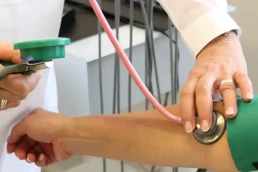Managing cholesterol effectively is one of the most impactful ways to protect your heart and overall health. High cholesterol levels can increase the risk of heart disease, stroke, and other chronic illnesses. This article will guide you through understanding cholesterol, its types, how to manage it through lifestyle changes, and when medications may be necessary.
What Is Cholesterol?
Cholesterol is a fatty substance that moves through your bloodstream. Your body needs it to build cells and produce hormones. However, high levels of cholesterol can lead to plaque buildup in your arteries, increasing your risk of cardiovascular diseases.
Types of Cholesterol:
- LDL (Low-Density Lipoprotein): Often termed “bad” cholesterol because it contributes to plaque formation in arteries.
- HDL (High-Density Lipoprotein): The “good” cholesterol that helps remove excess cholesterol.
- Triglycerides: Fats in the blood that, at high levels, can harden arteries.
Why Managing Cholesterol Is Crucial
High LDL cholesterol levels can cause atherosclerosis, while low HDL reduces your body’s ability to clear cholesterol. Together, these increase your risk for heart attacks and strokes. Regular testing, especially as you age, helps you stay on top of your cholesterol levels.
Advanced Lipid Testing
Beyond standard cholesterol tests, advanced lipid testing can provide deeper insights:
- ApoB: Reflects the number of particles carrying cholesterol.
- Lp(a): A genetic lipoprotein linked to inflammation and plaque buildup.
- NMR Lipid Profile: Measures particle sizes, highlighting smaller LDL particles that pose a greater risk.
Diet Strategies for Cholesterol Management
Your diet plays a significant role in cholesterol management. Here are effective dietary approaches:
- Vegan Diet: Eliminates animal products, rich in fruits, vegetables, and whole grains, significantly lowering LDL.
- Mediterranean Diet: Focuses on heart-healthy fats like olive oil, legumes, and fish.
- DASH Diet: Reduces sodium while increasing potassium, calcium, and magnesium.
Exercise for Cholesterol Health
Physical activity raises HDL, lowers triglycerides, and reduces LDL. Aim for at least 150 minutes of aerobic exercise weekly, combined with strength training for best results.
Supplements That Help Lower Cholesterol
Supplements can complement your lifestyle changes. Examples include:
- Plant Sterols and Stanols: Block cholesterol absorption in the intestines.
- Soluble Fiber: Binds cholesterol in the digestive tract.
- Omega-3 Fatty Acids: Reduce triglycerides.
- Red Yeast Rice: Contains natural statin-like properties.
Always consult with a healthcare provider before starting any supplements.
When Lifestyle Changes Aren’t Enough: Medications
Medications might be necessary to manage cholesterol. Common options include:
- Statins: Lower LDL by reducing liver cholesterol production.
- PCSK9 Inhibitors: Help the liver remove LDL from the bloodstream.
- Ezetimibe: Reduces cholesterol absorption in the intestines.
Track your medications and their effects in a log, and work closely with your doctor to optimize treatment.
Your Path to Healthier Cholesterol
Managing cholesterol requires a long-term commitment, but the rewards—reduced risk of heart disease, improved energy, and overall health—are worth the effort. Combining a balanced diet, regular exercise, and, when necessary, medications creates a solid foundation for cardiovascular health.
For more personalized guidance, schedule a consultation at Heart Health.
If you’re tired of the “conventional medical treatment” for heart disease (medications, surgeries and more), then you’ll want to learn if preventive cardiology is a good fit for you.
- People with a strong family history of heart disease
- People with uncontrolled cardiac risk factors such as high cholesterol, high blood pressure, diabetes, sleep apnea, or obesity
- People who have had a previous heart attack or stroke
- People who have been diagnosed with a heart condition and need help understanding their illness and want to avoid further problems
- People who are at risk for heart disease due to age, ethnicity, or other factors
- People with abnormal advanced lipid panels
- People with abnormal cardiac imaging results
- People interested in taking a proactive approach to their health
Preventive Cardiology
Your Partner In Proactive, Natural Heart Health Care For Lifelong Wellness.
If you’re tired of the “conventional medical treatment” for heart disease (medications, surgeries, and more), then you’ll want to learn if preventive cardiology is a good fit for you.
Heart-Healthy Reading
Reach out to us with your questions via our contact form. We do our best to reply within 3 business days.
Yes, a monthly membership option is available for ongoing care.
The membership allows me to work closely with you to modify your cardiac risk factors.
Today’s technology makes it easy to see a telemedicine cardiologist.
We use a state-of-the-art video platform and digital technology to provide you with the same high-quality care you would receive in an in-person visit.
We follow a direct specialty care model, so the relationship is between the doctor and the patient, and no insurance is involved.
Often patients find that they save money paying the doctor directly without copays or deductibles.
Reach out to us with your questions via our contact form. We do our best to reply within 3 business days.
![]()
Dr Paeschke is wonderful! Having had a heart attack two years ago, it’s an amazing relief to have an ongoing relationship with a cardiologist who is responsive, patient and super knowledgeable.My prior cardiologist was the one who happened to be attending at the hospital. Perfectly competent but impossible to get any meaningful attention.It’s the opposite with Dr Paeschke and the way she’s set-up her practice. I feel very fortunate!
David, Nevada
![]()
![]()
I highly recommend Dr Tracy for all your cardiac issues. I found it very easy to get an appointment, no months long wait, both initially and for important follow up visits -which are enhanced through calls or on-line chats with her. It’s important to me that I communicate directly with my doctor, especially given the breadth and complexity of the issues that we discuss and this is always the case. While Dr Tracy’s focus is on prevention using the latest technology/devices/testing, my needs are immediate and I feel very confident they are met and we have the best plan going forward to address them.
Mark, Colorado
![]()
![]()
Dr. Paeschke is an excellent cardiologist. She is thorough and takes time with me as a patient. The appointment is not rushed and I feel very valued and cared for. I really like that she is close to me in Monument as well. I highly recommend Dr. Paeschke to anyone looking for a preventative cardiologist.
Sharon, Colorado
![]()
![]()
I have always appreciated Dr. Paeschke’s wisdom, care, and knowledge, ever since being referred to her in 2007. Since, I have found that her Heart Health Prevention and Wellness has helped me become my own advocate in all areas of health in my life provide for a defined lifestyle change. Thank you! Dr. Tracy
Abe, Colorado
![]()












